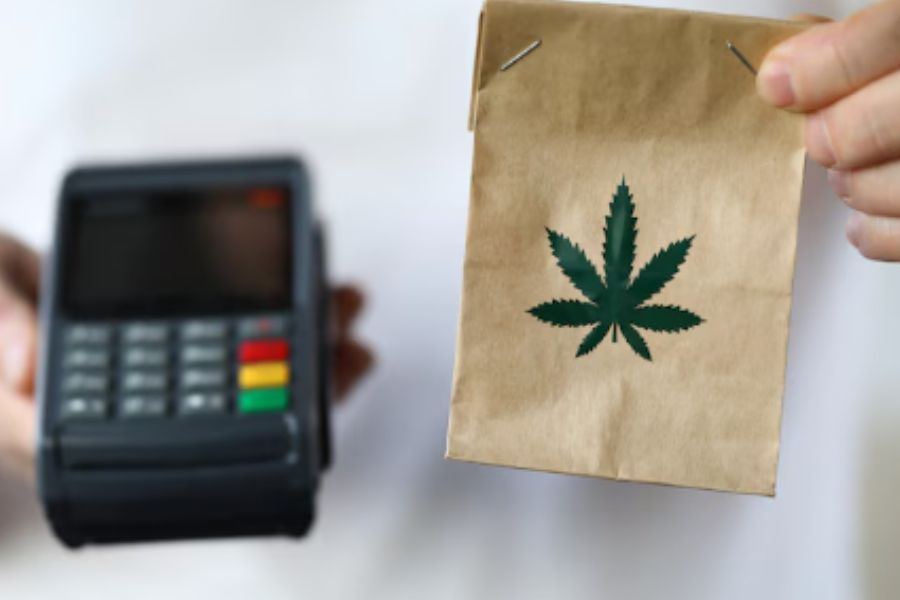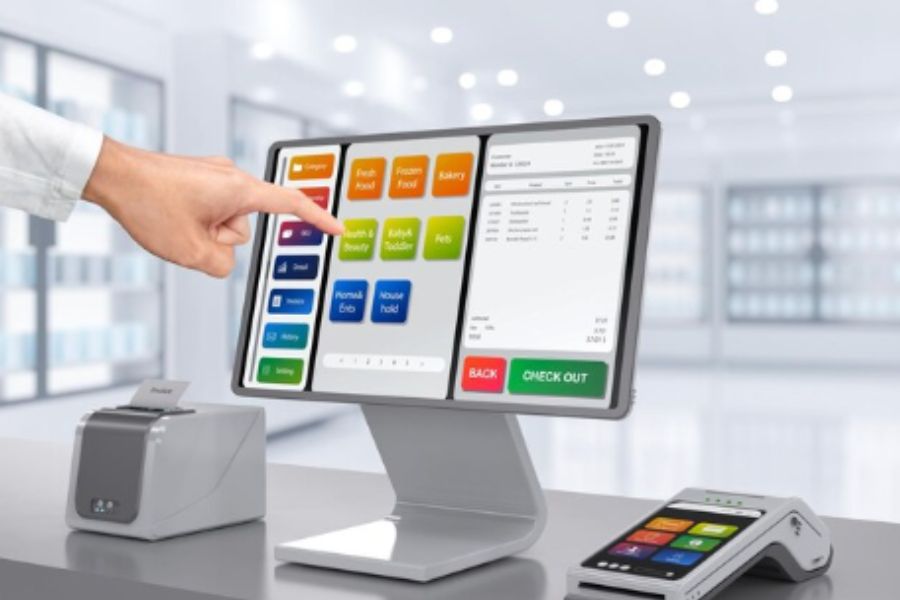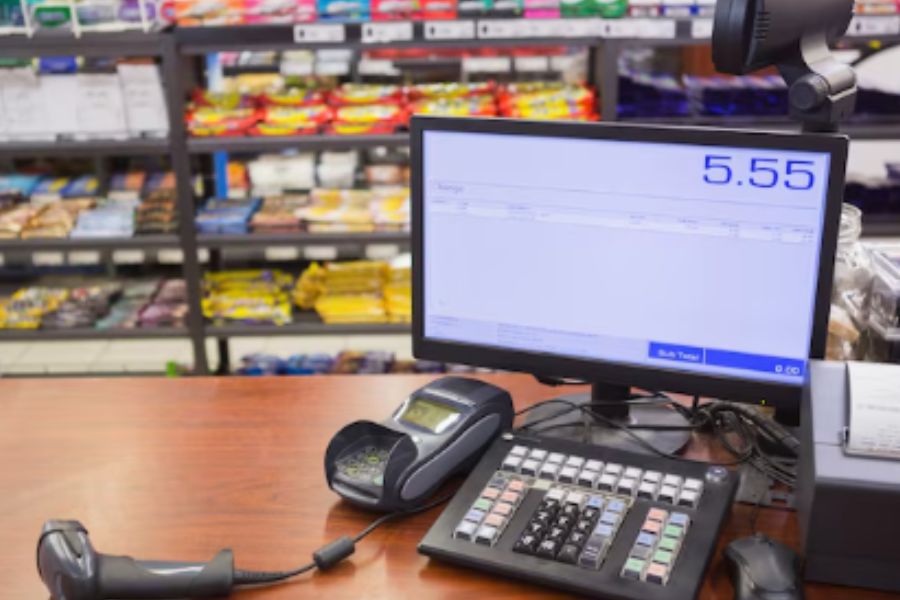The integration of self-service kiosk POS (point of sale) systems has become imperative for stores and supermarkets. These systems, known as “grocery market self service pos point of sale” are revolutionizing the retail landscape by offering enhanced efficiency and convenience. As customers seek faster checkout experiences and retailers strive to optimize operations, the adoption of self-service kiosk POS systems emerges as a strategic necessity. Let’s find out the key reasons why grocery stores and supermarkets must embrace this technology.
Overview of the grocery market and the growing trend of self-service kiosk POS
The grocery market is a dynamic and competitive sector where convenience and efficiency are paramount. In recent years, a growing trend has emerged in the form of self-service kiosk point of sale (POS) systems. These systems, commonly referred to as “grocery market self-service POS point of sale,” revolutionize the traditional checkout experience by empowering customers to handle transactions independently.
A self-service kiosk POS system in the grocery market is a technological solution designed to streamline the checkout process. It typically consists of interactive kiosks equipped with barcode scanners, touch screens, and payment terminals. Customers can simply scan the barcodes of their selected items, bag them, and complete the transaction using various payment methods, all without the need for cashier assistance.
The operation of a grocery market self-service point of sale system is straightforward. Customers begin by selecting the items they wish to purchase from the store shelves. Once they have gathered their items, they proceed to the self-service kiosk POS station. Here, they scan each item’s barcode using the built-in scanner or by manually entering product codes. The system then displays the scanned items on the screen, allowing customers to review their selections and make any necessary adjustments.
Importance Of Implementing Self-service Kiosk POS In Grocery Stores And Supermarkets
In the retail industry, the implementation of self-service kiosk point of sale (POS) systems in grocery stores and supermarkets is becoming increasingly important. These systems have a vital role to play in meeting the evolving needs and expectations of both retailers and customers.
Self-service kiosk POS systems offer grocery stores and supermarkets an opportunity to improve their operational efficiency. By automating the checkout process, these systems reduce the dependence on traditional manned checkout lanes, which leads to lower labor costs and better staff allocation. This allows retailers to allocate resources to other areas of the store where they can have a more significant impact, such as customer service or inventory management.
Moreover, self-service kiosk POS systems contribute to improved customer satisfaction and loyalty. In an era where convenience is king, customers appreciate the speed and convenience offered by self-checkout options. By providing a seamless and hassle-free checkout experience, grocery stores and supermarkets can enhance the overall shopping experience, leading to increased customer retention and positive word-of-mouth.
Not only that, but self-service kiosk POS systems enable retailers to stay competitive in a rapidly changing market. As consumer preferences continue to shift towards self-service and digital solutions, businesses that fail to embrace these technologies risk falling behind their competitors. Implementing self-service kiosk POS systems allows grocery stores and supermarkets to stay ahead of the curve and meet the evolving needs of their customers.
Self-service kiosk POS systems also offer valuable insights into customer behavior and purchasing patterns. By capturing data on transaction histories, product preferences, and buying trends, retailers can gain a deeper understanding of their customers and tailor their offerings accordingly. This data-driven approach to decision-making enables grocery stores and supermarkets to optimize their product assortments, pricing strategies, and promotional efforts, ultimately driving sales and profitability.
Benefits Of Self-service Kiosk POS In Grocery Stores And Supermarkets
Enhanced operational efficiency
- Centralized POS system for multi-store management
POS systems that support self-service kiosks (such as ConnectPOS) offer a centralized point-of-sale solution that can be easily managed across multiple store locations. This centralized approach allows for efficient oversight and coordination of sales activities, inventory management, and reporting, streamlining operations and reducing administrative overhead.
- Multi-register functionality for streamlined checkout processes
Multi-register functionality for streamlined checkout processes: self-service kiosk POS systems provide multi-register functionality, enabling multiple transactions to be processed simultaneously. This feature significantly reduces wait times during peak hours and enhances the overall efficiency of the checkout process. By allowing several customers to check out at once, retailers can effectively manage high-traffic periods, ensuring smooth operations and minimizing customer frustration. Customers can quickly scan and pay for their items, leading to shorter queues and improved satisfaction. This not only enhances the shopping experience but also reflects positively on the store’s reputation, encouraging repeat business and fostering customer loyalty
Advanced stock control features
- Real-time inventory synchronization for tracking, ordering, and receiving fresh stock
Self-service kiosk POS systems offer real-time inventory synchronization capabilities, enabling grocery stores and supermarkets to track, order, and receive fresh stock efficiently. By keeping inventory data up-to-date at all times, retailers can ensure accurate stock levels, minimize stockouts, and avoid overstocking, ultimately leading to improved inventory management and reduced wastage.
- Detailed inventory reports for monitoring stock health and velocity
These systems generate detailed inventory reports that provide valuable insights into stock health and velocity. Retailers can monitor key metrics such as product turnover rates, stock aging, and popular items, allowing them to make informed decisions regarding product placement, pricing, and promotions. Additionally, detailed inventory reports help identify trends and patterns, enabling retailers to optimize their inventory strategies for maximum efficiency and profitability. By leveraging this data, grocery stores and supermarkets can minimize stockouts, reduce excess inventory, and ensure a consistent supply of in-demand products. This proactive approach to inventory management not only improves customer satisfaction by ensuring product availability but also enhances overall profitability by minimizing carrying costs and maximizing sales opportunities.
Scalability for business growth
- Ability to scale the POS system to accommodate business expansion
Self-service kiosk POS systems offer the flexibility to scale according to the needs of the business. Whether opening new stores or expanding existing ones, these systems can easily accommodate growth without significant investment in additional hardware or infrastructure.
- Customized screen layout options for convenient product categorization and branding
These systems provide customized screen layout options, allowing grocery stores and supermarkets to categorize products and showcase branding conveniently. This flexibility enables retailers to tailor the user interface to align with their specific product offerings and brand identity, enhancing the overall customer experience and strengthening brand recognition.
Improved customer engagement
- Collection and management of customer profiles for loyalty programs
Self-service kiosk POS systems like ConnectPOS enable grocery stores and supermarkets POS to collect and manage customer profiles efficiently. By capturing valuable information such as purchase history, preferences, and contact details, retailers can personalize the shopping experience and tailor promotions to individual customers. This enhances customer engagement and loyalty by making shoppers feel valued and appreciated.
- Efficient staff management with rostering and availability tracking
These systems also contribute to efficient staff management through rostering and availability tracking functionalities. Retailers can easily schedule and allocate staff resources based on real-time data on store traffic and peak hours. This ensures that the right number of staff are available to provide assistance and support to customers during busy periods, improving overall service quality and satisfaction. Additionally, availability tracking allows managers to monitor employee schedules and ensure adequate coverage without overstaffing, optimizing labor costs and resource utilization. Overall, efficient staff management enhances the customer experience by ensuring prompt and attentive service, ultimately leading to increased customer satisfaction and loyalty.
Flexible payment options and speedy checkout
- Support for various payment methods to cater to customer preferences
Self-service systems offer support for a wide range of payment methods, catering to diverse customer preferences. Whether customers prefer to pay with cash, credit/debit cards, mobile payments, or contactless payments, these systems ensure flexibility and convenience at checkout.
- Implementation of self-checkout options to expedite the checkout process
One of the key benefits of self-service kiosk POS systems is the implementation of self-checkout options. By allowing customers to scan, bag, and pay for their items independently, these systems expedite the checkout process, reducing wait times and enhancing overall efficiency. Customers can complete their transactions quickly and conveniently, without the need for assistance from store staff, resulting in a seamless and hassle-free shopping experience.
Digital receipt management
- Provision of e-receipts for enhanced convenience and eco-friendliness
Self-service kiosk POS systems offer customers the option to receive electronic receipts via email or text message, eliminating the need for paper receipts. This not only enhances convenience for customers, as they no longer have to worry about keeping track of physical receipts but also contributes to environmental sustainability by reducing paper waste.
- Integration of receipt management into the self-service kiosk POS system
The receipt management functionality is seamlessly integrated into the self-service kiosk POS system, ensuring a smooth and efficient checkout experience for customers. This integration allows for easy retrieval of past transactions and simplifies processes such as returns or exchanges, enhancing overall customer satisfaction. Additionally, by consolidating receipt management within the POS system, retailers can streamline their operations and reduce the risk of errors or discrepancies.
Frequently asked questions (faqs) about self-service kiosks POS in grocery stores and supermarkets
- What are the key features to look for in a self-service kiosk POS system for grocery stores?
Key features to consider in a self-service kiosk POS system for grocery stores include:
- User-friendly interface for easy navigation.
- Reliable barcode scanning capability for efficient checkout.
- Support for multiple payment methods, including cash, credit/debit cards, mobile payments, and contactless payments.
- Integration with inventory management systems for real-time stock updates.
- Customizable options for branding and product categorization.
- Robust security features to protect customer data and prevent fraud.
- Scalability to accommodate business growth and changing needs.
- How does a centralized POS system help in managing multiple stores in the grocery market?
A centralized POS system enables seamless coordination and oversight across multiple stores by:
- Providing a unified platform for managing inventory, sales, and customer data.
- Allowing for centralized control of pricing, promotions, and product assortments.
- Facilitating real-time communication and data synchronization between stores.
- Streamlining reporting and analytics for comprehensive insights into overall business performance.
- Simplifying administrative tasks such as software updates, maintenance, and support.
- Can the self-service kiosk POS system track both fast-moving and slow-moving products in real time?
Yes, the self-service kiosk POS system can track both fast-moving and slow-moving products in real-time by:
- Utilizing real-time inventory synchronization to monitor stock levels and movement.
- Generating reports and analytics to identify trends and patterns in product sales.
- Providing alerts and notifications for low stock levels or expired products.
- Supporting automated reordering processes to ensure adequate inventory levels at all times.
- Is it possible to customize the screen layout of the self-service kiosk POS to suit our grocery store’s branding and product categories?
Yes, most self-service kiosk POS systems offer customizable screen layout options to align with grocery store branding and product categories. Retailers can personalize the interface by:
- Choosing color schemes, fonts, and graphics that reflect the store’s brand identity.
- Organizing product categories and menus for intuitive navigation.
- Incorporating promotional banners, advertisements, and loyalty program information.
- Adjusting the layout based on customer feedback and usability testing.
- What payment options are supported by the self-service kiosk POS system, and how does it ensure speedy checkout?
Self-service kiosk POS systems typically support a wide range of payment options to cater to customer preferences, including:
- Cash
- Credit/debit cards
- Mobile payments (e.g., Apple Pay, Google Pay)
- Contactless payments (e.g., NFC, QR code)
- To ensure speedy checkout, these systems streamline the payment process by:
- Offering fast and reliable payment processing capabilities.
- Minimizing transaction times through efficient barcode scanning and payment authorization.
- Providing clear instructions and prompts to guide customers through the checkout process.
- Optimizing the user interface for quick and intuitive interaction, reducing the likelihood of errors or delays.
Conclusion
The adoption of self-service kiosk POS systems is essential for grocery stores and supermarkets to thrive in the modern retail environment. By embracing “grocery market self service pos point of sale” technology, retailers can elevate the shopping experience, improve operational efficiency, and stay ahead of the competition.
If you want to explore a POS system which supports self-service kiosks, feel free to contact us.



